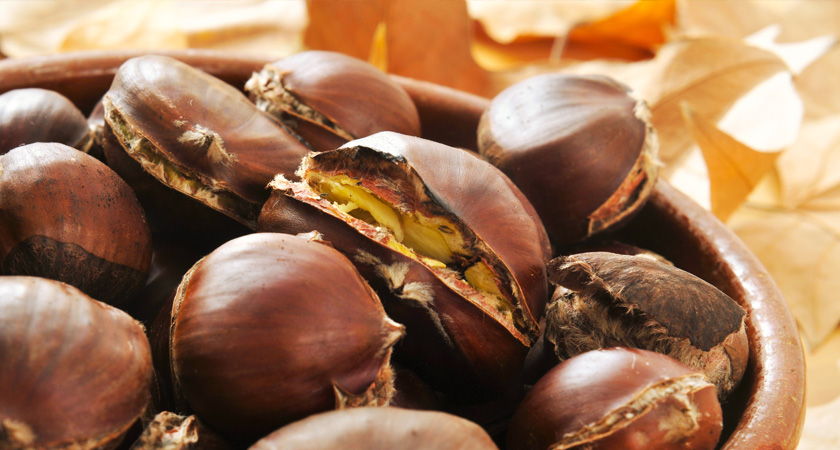https://cdn.steemitimages.com/DQmbXvRMw3zAeoXzNyoP2sNeFrFSGKniPQzkjiPMU6jzFmT/imagenes116a.jpg
[source](http://www.palacios.es/palacios/usuariosFtp/conexion/imagenes116a.jpg)

The properties of chestnuts beneficial to our health are different and all derive from the antioxidant activity exerted by the micronutrients they contain. Chestnuts have anti-inflammatory properties thanks to the presence of phenolic acids, known for their powerful antioxidant action and their ability to prevent an oxidative stress condition. Chestnuts contain a large amount of phenolic acids and in particular the aforementioned gallic and ellagic acid, flavonoids (quercitin, rutin and apigenin) and tannins. Chestnuts are a very digestible fruit. In addition, thanks to the abundance of dietary fiber, they are useful for preserving or restoring intestinal regularity. They do not contain gluten and have a nutritional value similar to that of cereals; therefore, they can completely cover the carbohydrate part of the food and are very suitable for celiac disease. We can talk about prebiotics when we refer to all those compounds that our bacterial flora can use as a growth substrate, to feed and stay healthy. In this sense, a prebiotic effect of chestnuts has been reported thanks to the presence of components that humans cannot easily digest. Ingestion of chestnuts is also useful to increase the vitality of probiotic microorganisms during passage in the stomach. Chestnuts are a good source of fiber, substances that limit the absorption of cholesterol. In addition to fiber, the omega3 and omega6 fatty acids present in the fruit also contribute to cholesterol reduction. Chestnuts contain a good presence of vitamin E, essential for the well-being of our nervous system and for the prevention of a series of age-related degenerative diseases. Chestnuts are a good source of folic acid, which is essential for normal cell function and tissue growth. It is also essential in pregnancy for the proper development of the fetus and avoid serious pathologies such as spina bifida. It is also useful for reducing physical and mental fatigue. Chestnuts have a good zinc content that is important for the maturation of the gonads and for the proper functioning of the immune system and the prostate. It is also a component of different enzymes and is involved in the proper functioning of taste and smell. Chestnuts are antibacterial. This antimicrobial activity seems to be due to the presence of phenolic compounds in chestnuts and, in particular, it seems that the greatest effect is exerted by quercin and routine. Chestnuts, thanks to the richness of minerals, are a useful food in case of asthenia, in convalescence after a flu, in children and the elderly. They are very caloric and, therefore, constitute a good source of energy; This feature makes it suitable for the diet of athletes and all people who need to increase their energy consumption. Thanks to the antioxidant content, chestnut extract could be useful for improving hydration and skin damage caused by exposure to UV rays. There are relatively few studies that have evaluated this effect of chestnuts and, in this sense, other research will be necessary.

Originally posted here: https://steemit.com/farms/@alicargofer/chestnuts-and-their-health-benefits


No comments:
Post a Comment